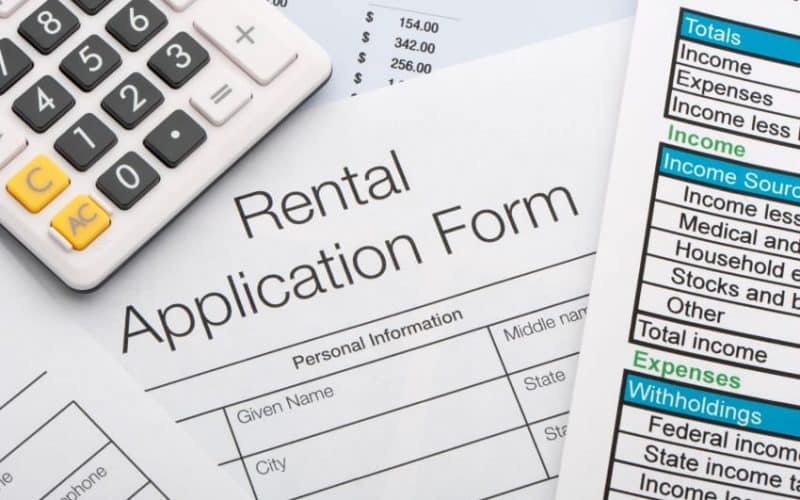Finding a place to rent that fits your budget and needs can be quite a challenge. A rental application is an important part of the process of finding a new place to live. It is a document that provides the landlord or property manager with important information about you. In this blog, we will discuss the meaning and importance of a rental application, what it should include, what makes you stand out as a rental applicant, and what credit score is used for rental applications.
Introduction to Rental Applications
A rental application is a form that prospective tenant fills out with their personal and financial information. It is then submitted to the landlord or property manager for consideration when deciding whether to rent to the tenant. The rental application helps the landlord or property manager determine if the tenant is a suitable candidate for the rental unit. The information provided on the rental application is used to perform a credit and background check on the tenant.
When filling out a rental application, it is important to be honest and provide accurate information. Lying on a rental application can have serious consequences and may result in the landlord or property manager denying the application. It is also important to be aware of your rights as a tenant and to make sure that the rental application does not violate any laws or regulations.
What Does a Rental Application Include?
The information requested on a rental application may include the following:
- Personal information, such as name, address, phone number, and email address
- Employment and income history
- Rental history
- Credit score
- Bank account information or references
- Background check
The landlord or property manager may also ask for additional information, such as any pets or vehicles the tenant plans to bring with them.
What Should a Rental Application Letter Include?
In addition to the information requested on a rental application, it is also important to include a rental application letter. This letter should provide the landlord or property manager with a more in-depth look at the tenant’s character and financial standing. The rental application letter should include information about the tenant’s job and salary, rental history, personal references, and any other relevant information that the landlord or property manager should know.
The rental application letter should also provide an explanation of any negative information that may appear on the tenant’s credit report. This could include late payments, bankruptcies, or other blemishes on the tenant’s credit history.
What Makes You Stand Out on a Rental Application?
In addition to providing accurate and truthful information on the rental application, there are other things that you can do to make yourself stand out as a rental applicant. These include:
- Having a good credit score: A good credit score can go a long way in helping you stand out as a rental applicant. A credit score of 700 or higher is generally considered to be a good score and will make you more attractive to potential landlords or property managers.
- Having a steady income: Having a steady income is another way to stand out as a rental applicant. Demonstrating that you have a stable job and a reliable source of income will make you a more attractive candidate to potential landlords or property managers.
- Providing references: Providing references from past landlords or employers can help you stand out as a rental applicant. These references can provide the landlord or property manager with additional information about you that may not be included in the rental application.
What Credit Score is Used for Rental Applications?
When it comes to rental applications, most landlords or property managers will use a tenant’s credit score to assess their eligibility for renting a property. A credit score is a three-digit number that is calculated based on the information in a person’s credit report. Generally, a credit score of 700 or higher is considered to be a good score and will make you more attractive to potential landlords or property managers. However, some landlords or property managers may be willing to accept a lower credit score if the tenant can demonstrate that they have a steady income and good rental history.
How Do I Sell Myself on a Rental Application?
When applying for a rental property, it is important to not only provide accurate and truthful information on the rental application but also to try to “sell” yourself to the landlord or property manager. This can be done by providing references from past landlords or employers and by providing additional information about yourself and your financial situation. You can also provide a cover letter that explains why you are a good candidate for the rental property and why you would be a good tenant.
How Do I Become a Successful Rental Applicant?
In order to become a successful rental applicant, it is important to have a good credit score, a steady income, and a good rental history. It is also important to provide accurate and truthful information on the rental application and to provide additional information about yourself and your financial situation. Additionally, having references from past landlords or employers can help to demonstrate to the landlord or property manager that you are a reliable and responsible tenant.
What Should You Ask on a Rental Application?
When filling out a rental application, it is important to ask questions about the property and the landlord or property manager’s policies. These questions should include:
- What are the terms of the lease?
- Are there any special rules or restrictions?
- What is the landlord or property manager’s policy on pets?
- What is the landlord or property manager’s policy on late payments?
- What utilities are included in the rent?
- Does the landlord or property manager require a security deposit?
Asking these questions will help you to understand the landlord or property manager’s policies and will help to ensure that you and the landlord or property manager are on the same page.
How Do I Write a Letter for a Housing Application?
When applying for a rental property, it is important to include a rental application letter along with the rental application. The rental application letter should provide the landlord or property manager with additional information about you and your financial situation. The letter should include information about your job and salary, rental history, personal references, and any other relevant information that the landlord or property manager should know. The letter should also provide an explanation of any negative information that may appear on the tenant’s credit report.
What Not to Put on a Rental Application?
When applying for a rental property, it is important, to be honest, and provide accurate information on the rental application. It is also important to be aware of your rights as a tenant and to make sure that the rental application does not violate any laws or regulations. Additionally, it is important to not include any false or misleading information, discriminatory language, or sensitive information such as Social Security numbers or bank account numbers.
Crafting a Cover Letter for a Rental Application
In addition to the rental application, it is also important to include a cover letter. The cover letter should provide the landlord or property manager with a more in-depth look at the tenant’s character and financial standing. The letter should include information about your job and salary, rental history, personal references, and any other relevant information that the landlord or property manager should know. Additionally, the letter should provide an explanation of any negative information that may appear on the tenant’s credit report.
Frequently Asked Questions About a Standard Rental Application
#1. What does a rental application serve?
A rental application is a document that collects information, and the data it requests should demonstrate the applicant’s ability to rent out the land. As a result, it is vital that the information requested be both legal and specific. The normal rental application contains five major sections: personal information, history of residency, employment/income, references, and miscellaneous. Depending on the program, the order and questions may alter. However, the basic idea remains the same: you want to learn as much as you (legally) can about the candidate.
#2. Is it criminal to make false statements on rental applications?
It may not be illegal, but you should be aware that most rental agreements and leases contain terms stating that your tenancy may be terminated if any information you provided on your application is found to be fraudulent. You should be forthright and honest in your applications, and if you think you need to clarify something, do so. No one enjoys being lied to, especially in business. Landlords want to know who they rent to, and renters are often irritated when a landlord forgets to inform them about the rental unit. On all sides, honesty is always the best policy.
#3. How much does the average rental application fee cost?
Most application fees range between $30 and $50 per candidate. The screening price is usually divided into two categories:
“Out of pocket” costs related to obtaining and accessing screening reports. This is the most prevalent reason why agents and landlords pay a fee. For example, your tenant screening company may charge you $30 to obtain screening reports.
Labor costs related to collecting, analyzing, and checking an applicant’s tenant screening kit.
Agents and landlords do not charge as much for this as part of the screening cost because it is difficult to calculate. For example, you might spend two hours assembling a completed application packet, producing screening reports, and analyzing an applicant’s references. This component may be a little more ambiguous because some California rental application fee policies impose specific limitations on applicants.
Landlords Related Documents
- Template for a Land Lease: A land lease is an arrangement between the owner of vacant land or property and a person or entity that wants to develop or improve the property.
- Lease/Rental Contract: A lease agreement is a written instrument that formally recognizes the existence of a legally binding relationship between two parties – a landlord and a tenant.
- Short-Term Rental Agreement: Are you thinking about renting out your house to vacationers or short-term visitors? Here’s how to make a short-term vacation rental leasing agreement.
- Sublease Contract: A Sublease Agreement is a contract between the original tenant who is currently leasing the premises and the new tenant who will be moving in.
Conclusion
A rental application is an important part of the process of finding a new place to live. It is a document that provides the landlord or property manager with important information about the tenant’s personal and financial situation. It is important, to be honest, and provide accurate information on the rental application and to include a rental application letter that provides the landlord or property manager with a more in-depth look at the tenant’s character and financial standing. Additionally, having a good credit score, a steady income, and a good rental history can help to make you stand out as a rental applicant. Following these tips can help you to become a successful rental applicant.
Related Articles
- BUYING A RENTAL PROPERTY: Tips on Buying a Rental Property (Updated 2023)
- Top 10 Rental Management Software In 2023: Features & Reviews
- LANDLORD INSURANCE: Coverages, And Costs
- CONSTRUCTION BUSINESS: Detailed Startup Guide
- RENTAL CONTRACT: Agreements, Templates; Samples for Housing






